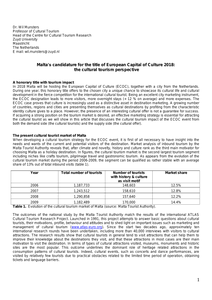This paper examines a paradoxical issue in tourism's adaptation to climate change and emissions reduction demands. Operators increasingly take tourists to destinations threatened by climate change, with Antarctica and other polar regions as favourites and cruise ship and aircraft as main transport modes. The selling point is to see a destination before it disappears, a form of last chance tourism. This has been claimed to increase the environmental awareness of tourists and make them "ambassadors" for conservation and the visited destination. Antarctic cruise ship passengers tripled from 2000 to 2007. The paper finds that high levels of greenhouse gas emissions are created by cruise ship tourists in general, and especially high levels for those visiting the Antarctic, up to approximately eight times higher per capita and per day than average international tourism trips. A survey found no evidence for the hypothesis that the trips develop greater environmental awareness, change attitudes or encourage more sustainable future travel choices. Of the Antarctic cruise passengers surveyed, 59% felt that their travel did not impact on climate change; fewer than 7% had or might offset their emissions. Alternative opportunities for visitation to glacial/polar destinations that comply with the desire to reduce future emissions are discussed.
LINK
De kandidatuur van Malta als Europese Culturele hoofdstad in cultuurtoeristisch perspectief
DOCUMENT

This paper presents four Destination Stewardship scenarios based on different levels of engagement from the public and private sector. The scenarios serve to support destination stakeholders in assessing their current context and the pathway towards greater stewardship. A Destination Stewardship Governance Diagnostic framework is built on the scenarios to support its stakeholders in considering how to move along that pathway, identifying the key aspects of governance that are either facilitating or frustrating a destination stewardship approach, and the required actions and resources to achieve an improved scenario. Moreover, the scenarios and diagnostic framework support stakeholders to come together to debate and scrutinise how tourism is managed in a way that meets the needs of the destination, casting new light on the barriers and opportunities for greater destination stewardship.
DOCUMENT

By use of a literature review and an environmental scan four plausible future scenarios will be created, based on the research question: How could the future of backpack tourism look like in 2030, and how could tourism businesses anticipate on the changing demand. The scenarios, which allow one to ‘think out of the box’, will eventually be translated into recommendations towards the tourism sector and therefore can create a future proof company strategy.
DOCUMENT

This lessons learned report gives an overview of the output and results of the first phase of the REDUCES project. The introduction states the relevance of combining a policy approach with business model analysis, and defines the objectives. Next, an overview is given of circular economy good business practices in the regions involved. Examining these business practices helped to define the regional needs for circular economy policy. This business approach proved to be a solid base for developing regional circular economy action plans, the last chapter of this report.
DOCUMENT

This literature review explores ways older workers might continue to make waves and impact their work organization. The topic of the paper is grounded in the problem of an ageing organizational population looming in the near future. The work presented here is a start to helping management in knowledge-intensive organizations to understand how to effectively utilize the capacities of older knowledge workers by stimulating intergenerational learning as a means to retain critical organizational knowledge, encourage innovation and promote organizational learning through knowledge building. First, the concept of intergenerational learning is developed followed by a discussion of the organizational factors important for it to take place. The last section presents ideas on how to design and implement intergenerational learning as an organizational development program.
MULTIFILE

With this paper, it is illustrated that a focus on entrepreneurship training in the nature and wilderness sector is relevant for diverse organisations and situations. The first curricula on nature entrepreneurship are currently being developed. In this paper the authors describe a project that focusses on educating the next generation of nature entrepreneurs, reflect on the Erasmus Intensive Program ‘European Wilderness Entrepreneur’ and the Wild10 World Café on nature entrepreneurship training. Sharing and learning from experiences is highly recommended to further develop and strengthen the curricula while considering the dynamic context of nature conservation and restoration of ecological processes.
DOCUMENT

This article investigates the transformative impacts of regular nature-based adventure activity engagement and its long-lasting effects on eudaimonic well-being (EWB), specifically mental health. Although extant research highlights a wide range of well-being and mental health benefits from participation in such pursuits, less is known about experienced outdoor adventure enthusiasts for whom adventure is a fundamental and transformational part of their lives. The study builds on an existing conceptual framework that synthesizes pertinent research concepts on nature-based activity engagement and subjective well-being benefits. It presents key findings from 40 semi-structured in-depth online interviews with respondents from the UK, Germany, and Serbia. Interview data were collated and analyzed using a thematic framework approach. The findings highlight the importance of outdoor adventure activity engagement for respondents’ mental and physical health and long-term well-being. Regular activity participation can be transformational in reducing feelings of ill-being and enhancing EWB. It can improve self-efficacy and identity development and promote the fulfilment of psychological needs, facilitated by key transformational catalyzers. Continually entering a liminal state, experiencing emotions, and overcoming challenges and risks during engagement are crucial to “successful” long-lasting transformation. Further research should continue to explore adventure’s transformational and EWB benefits to develop long-term data.
DOCUMENT
